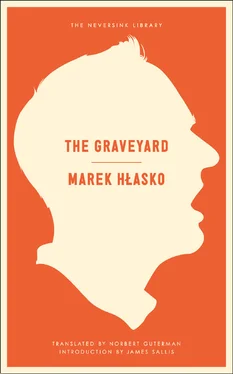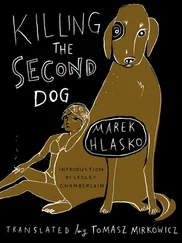“What can we do?” the lieutenant replied. “This is your first time. Occasionally people have too much fun, and our job is to keep order in the streets.”
They walked on a bit and found themselves in a small empty room. The lieutenant said: “Wait here a minute. We’ll release you shortly.”
Franciszek sat down on the bench and luxuriously stretched his numbed legs. “At last,” he thought. “Here is a sensible fellow that can listen to reason. The fact is, I’d have been home by now if I hadn’t been so damn touchy. It’s a good thing I told Elzbieta about this meeting; she won’t be worried. It looks as though there’s something to say for meetings, though you’d never think so in advance. A bit of vodka, exhaustion, nerves — that’s all it takes to find yourself in a cell.
Oh, to hell with it!”
The door opened, and the lieutenant came in. Franciszek looked at him with a smile, and then was dumfounded: it was as though an entirely different man was standing before him. During those few minutes the lieutenant’s friendly young face had managed to assume the repellent mask of officialdom and contempt. He looked at Franciszek with cold, venomous eyes. “We’re going back,” he said dryly.
Franciszek rose. “Where to?”
“The cell.”
“But why?”
“You’re under arrest,” the lieutenant said. He stared at Franciszek as if he were an inanimate object; a note of impatience had crept into his voice. “Haven’t you had time to realize that, Kowalski?”
“But why? What for? I did nothing wrong. Can’t you at least tell me what for?”
“You’ll know in due time,” said the lieutenant. He pointed to the door. “If you please.”
“I’ve got to know right away,” Franciszek cried. “I won’t go anywhere until I know.”
The lieutenant walked up to him, put his hand on his arm, and leaned toward him. Franciszek shriveled, suddenly seized with fear.
“The fact that you’re a party member and former partisan makes no difference now,” he said. “The only thing that matters to us is that you are a man we must hold. No use thinking about the other things; I’m afraid they don’t matter. And now, let’s go.” He pressed Franciszek’s arm with his unexpectedly powerful fingers. Franciszek rose and followed the lieutenant. He did not say a word as they walked along the corridor. The lieutenant too was silent, walking erect, his legs stiff as though he were on parade.
Back in his cell, Franciszek sat down again on the bit of concrete from which he had arisen a few minutes earlier to set out on his futile journey. “What’s going on?” he thought feverishly. “For God’s sake, what do they want of me?”
The man at his side stirred and once again sat up rubbing his eyes like an ape. “Have you brought some cigarettes?” he asked after a long, powerful yawn.
Franciszek shook with rage. “Stop bothering me — you and your cigarettes,” he growled.
The stranger smiled. “That’s the way it is,” he said. “They’re in no hurry. If they want to, they can keep you here so long you’ll never want to laugh again.”
“What could I have done?” Franciszek asked, speaking to himself rather than to his neighbor. “What in the world could I have done? I keep trying to recall every word I said, everything that happened, and I can’t understand a thing. If only they would tell me, but they won’t. What could I have done?”
The stranger stretched luxuriously. “Each one of us imagines he didn’t do anything,” he said. “Each one of us somehow thinks he is innocent. But then a moment comes when others begin to have power over him, and then our thoughts don’t matter, and only what they think about us matters.” He sighed and turned over. “Thank God I’m nothing but a drunk,” he said. “That’s the only thing that gives me some sort of assurance; if anyone thinks anything about me, it will be only that. Good night. Try to get some sleep. And pretend the whole thing is a dream. A rotten, stupid dream, from which we’ll never awaken.”
AT LAST DAYBREAK CAME, AND WITH IT A PIERCING cold invaded the cell. Gray light filled the little window up by the ceiling. The faces of the recumbent men became more distinct, emerging from the darkness, puffy, disheveled, with bloodshot eyes. One after another, they sat up on the concrete floor; they looked about them unseeing, then, yawning and shivering, rose on shaky legs. From the street came the first sounds of the awakened city — passing trucks, hurrying footsteps, creaking tramcars.
Franciszek had sat numb while the cell was dark and silent; his only emotions had been anxiety and anger. But now the realization that only a few yards away, just outside the police station, hundreds of thousands of people were living a normal life without his being able to share in it threw him into a fit of dejection such as he had not experienced for a long time. “This is perhaps the worst thing that can happen to a man,” he thought. “Worse than sickness, solitude, any kind of misfortune. To be cut off from the life of others — can there be anything worse? Is there anything that can get you further down? I’ve had only a few hours of this; how terrible must be the life of a man condemned to endure it for long!” He was seized by only one overwhelming desire: to get out as soon as possible, to be in the streets, in the midst of people and the city bustle.
The door creaked. The lieutenant appeared in the doorway. A card in his hand, he said: “Romanowski, Bolder, Krupinski, come out.”
Three men rushed to the door. Franciszek followed them. “And what about me?” he asked.
“Wait,” said the lieutenant.
“I could still get to my job on time,” Franciszek said.
The lieutenant shut the door in his face without answering; Franciszek had barely time to jump back. Several of his cellmates laughed. “You’ll pay for this,” he thought resentfully. “You’ll pay for all your stupidities. I’ll see to it that all of you are thrown off the force, straight out on your faces. That’ll show you that you can’t treat an honest citizen like this.” Pacing back and forth, he planned all kinds of vengeance for everything they had done to him here.
The cell grew animated; the inmates recalled the events of the day before. Some cracked jokes; others sat staring vacantly. One man kept saying: “What am I going to tell my wife? What am I going to tell my wife? I promised her this would never happen again.”
On one of the benches three young men were sleeping. The others felt sorry for them, seeing them huddled together like kittens. All of them wore homemade clothes, narrow trousers, yellow shirts, and garish socks. Their faces were black and blue, and their noses were smashed; they had obviously been arrested for brawling.
Suddenly one of them woke up. He ran his fingers through his hair, and nudged his companions. “Kusiatynszczak, get up!” he cried. “The sun is up. Time to go to work.”
The other two awoke. They exchanged affectionate glances, then sang in hoarse voices:
“Welcome you comrades, to work, to work,
Our factories bustle, our furnaces blaze,
My country, my home, my happy home,
To build a house of dreams by our common efforts …”
“Shut up,” someone growled. Franciszek looked at him: he was the giant with the bald head who had slept standing up.
The door creaked again, and all glanced toward it. In the doorway stood the lieutenant and a man in civilian clothes. The latter was small; he had a surprisingly round face, a thin nose, and dark eyes set very close together.
“Kowalski,” the lieutenant said. “Will you come here, please.”
Franciszek walked to the door and stood facing the man in plain clothes. The other looked him over. Franciszek caught only a glimpse of his eyes, but it seemed to him that his innermost thoughts were being read.
Читать дальше






![Ричард Деминг - Whistle Past the Graveyard [= Give the Girl a Gun]](/books/412176/richard-deming-whistle-past-the-graveyard-give-t-thumb.webp)


